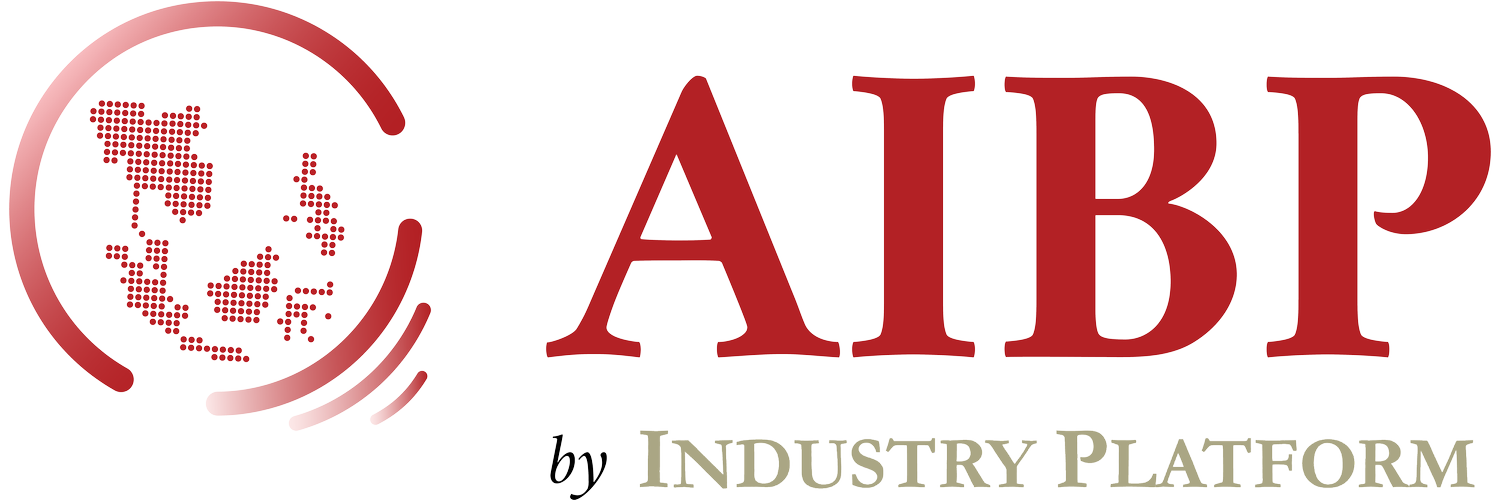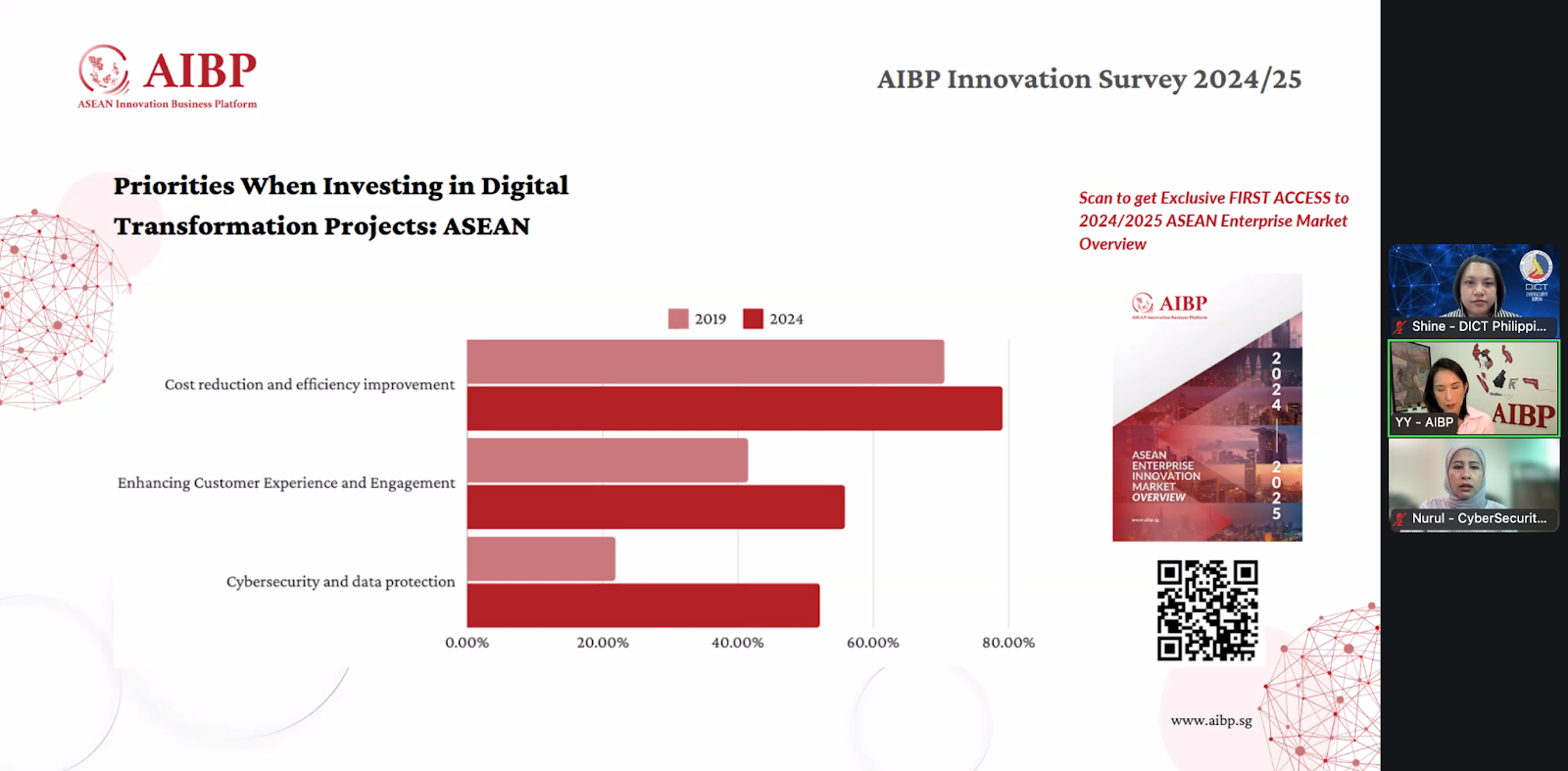Building AI-Driven Cyber Resilience in Malaysia & the Philippines
The 2024 ASEAN Enterprise Innovation Survey revealed a shifting paradigm in the cyber security landscape, with 39.5% of Malaysian organisations citing cyber security and privacy concerns as major challenges in their digital transformation efforts. Further, 52% of organisations—a substantial leap from 22% in 2019—are prioritising cyber security and data protection in their digital transformation investments. This aligns with findings from the ASEAN Cyber Security Survey where 45.4% of respondents are focusing on digital transformation and security as a key strategic goal.
In the recently concluded AIBP Insights: Building AI-Driven Cyber Resilience, the spotlight was on the burgeoning business opportunities within the rapidly evolving cyber security landscapes of Malaysia and the Philippines. Both nations are experiencing significant growth in their digital economies, presenting lucrative prospects for cyber security firms looking to expand their footprint in Southeast Asia.
Engr. Maria Sinag (Shine) Abello from the Philippine Department of Information and Communications Technology (DICT) and Nurul Husna Mohamad Nor Hazalin from CyberSecurity Malaysia (CSM) provided actionable insights on navigating evolving compliance landscapes, deploying AI for enhanced threat detection, and forging strategic partnerships to build resilient cyber infrastructures. Their discussion highlighted how AI-driven strategies are not only strengthening cyber security against evolving threats but also creating new business opportunities in Southeast Asia's fast-growing digital economy.
Cyber security and data protection have experienced the fastest growth among digital transformation priorities in ASEAN, as reflected in the AIBP Innovation Survey 2024/25.
Key Insights:
Cyber Security Talent Gaps: Both Malaysia and the Philippines face shortages of skilled professionals, prompting government-led initiatives to train thousands in AI-driven threat detection, cloud security, and digital trust.
AI in Cyber Resilience: AI is streamlining security operations by automating log analysis, enhancing digital forensics, and improving real-time threat detection, but concerns over ethical deployment and governance remain.
Regulatory Challenges and Compliance: Malaysia’s Cyber security Act 2024 and the Philippines’ data sovereignty policies are reshaping compliance requirements for businesses, particularly in cloud security and AI adoption.
Emerging Cyber Threats: Fraud, deepfakes, and AI-powered cyberattacks are rising, pushing enterprises to invest in AI/ML-based security solutions to enhance detection and response capabilities.
Digital Trust and AI Governance: Strengthening digital trust is a key priority, with governments focusing on certification programs, AI security testing, and regulatory frameworks to balance innovation with risk mitigation.
Cyber Security Talent Shortages and Government Initiatives
Based on the 2024 AIBP Cyber Security Survey, 42.5% firms cite a shortage of cyber security talent. Both Malaysia and the Philippines are facing significant talent shortages in cyber security. Malaysia aims to train 25,000 professionals by 2025, while the Philippines targets 10,000 professionals. Challenges include high certification costs, lack of structured career paths, and the need for specialised training in areas like cloud security, AI-driven threat detection, and digital trust governance.
Challenges in Building Cyber Security Academies
Both Malaysia and the Philippines face the challenge of making cyber security training affordable and accessible for their populations. Cyber security training from established providers can be cost-prohibitive, so the countries are exploring ways to develop their own tailored, cost-effective training modules. This includes collaborating with universities to integrate cyber security curricula and seeking grant funding to subsidise training programs and make them more accessible to a wider audience.
The Role of AI in Cyber Resilience
In AIBP’s 2024 Cyber Security Survey, 26.7% of enterprises indicate a significant increase in their investment in AI-driven cyber security solutions, with an additional 58.3% anticipating moderate increase. You may indicate interest here to access more findings in AIBP’s newly published report on AI Enhanced Security through Platforms.
AI is increasingly integrated into cyber security strategies, particularly in Security Operations Centers (SOCs) and digital forensics. AI-driven tools are improving efficiency by automating log analysis, prioritising threats, and streamlining forensic investigations. In SOCs, AI is helping to shift analysts' focus from mundane tasks to more advanced analysis, enhancing the overall effectiveness of security operations. However, concerns remain over ethical AI deployment, security testing, and compliance with evolving regulatory frameworks.
Emerging Cyber Threats and Regulatory Challenges
Cyber threats such as fraud and AI-generated deepfakes are on the rise. Malaysia reported 2,778 fraud cases in 2024, highlighting the urgent need for AI/ML-powered fraud detection. Meanwhile, the Philippines has implemented policies to ensure data sovereignty, mandating that sensitive government data be stored within national borders under strict security frameworks.
AI Governance and Digital Trust Initiatives
Both nations are actively working on AI governance frameworks. Malaysia recently launched the National AI Roadmap and established its National AI Office to oversee the development and implementation of AI policies. CyberSecurity Malaysia, in collaboration with the National AI Office, is also developing AI security testing protocols. In the Philippines, legislative efforts are underway to establish an AI authority and implement workforce development programs. Building digital trust remains a top priority, with both countries exploring government-certified vendor programs and robust security validation mechanisms.
Strategic Partnerships and Industry Collaboration
Public-private partnerships are essential in addressing cyber security challenges. CyberSecurity Malaysia and DICT Philippines emphasised the importance of collaboration with universities, foreign tech firms, and local enterprises to enhance cyber security capabilities. Both nations are also focusing on developing affordable cyber security training programs to widen industry participation.
Future Focus Areas
Key cyber security priorities in Malaysia include cloud security, AI security testing, and operational technology (OT) security. The Philippines is focusing on cyber security policy reforms, critical infrastructure protection, and workforce capacity building. As AI adoption accelerates, ensuring regulatory compliance, digital trust, and cross-border cooperation will be critical in shaping a resilient cyber security ecosystem in Southeast Asia.
For more insights into the cyber security landscape in Southeast Asia, check out our AIBP ASEAN B2B Growth Podcast episodes below:
“PNB: Building Trust in a Zero-Trust World” for insights on the evolving threat landscape in Malaysia with emphasis on the importance of platformisation and AI in cyber security
“TNG Digital: Navigating the Tightrope of Innovation and Risk Management” for insights on the role of data and AI in enhancing security and decision-making, and the need for public education on data protection.
“Globe Group: Securing the Digital Future” for insights on how Globe Group tackles data privacy, fraud, and nation-state espionage through a culture supportive of cyber security and AI

